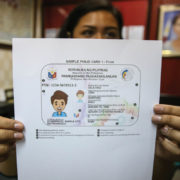The national ID system garnered mixed reactions from the general public after President Rodrigo Duterte signed its implementation into law on Monday, August 6, at Malacanang.
The law, otherwise known as the Republic Act of 11055 includes the establishment of the Philippine ID system (PhilSys), a centralized database that contains all the necessary and vital information of the residents in the country. It will also signify a unified and streamlined identification system for every citizen.
Supporters of the said law praised the initiative stating that a national ID will expedite government processes and basic services and will also put an end to bureaucratic red tape. However, those in opposition expressed concern with the privacy issues it might entail.
In a report from Inquirer, among those who support the law were Catholic leaders, law enforcers, and public officials while those who do not agree with the law’s provisions were human rights groups.
Church leaders, law enforcers and public officials pro-PhilSys
Catholic Bishops Conference of the Philippines (CBCP) Episcopal Commission on the Pastoral Care of Migrants and Itinerant People Head Bishop Ruperto Santos said that the law would benefit Overseas Filipino Workers (OFWs) and will protect them against bribery and red tape.
Armed Forces of the Philippines (AFP) spokesperson Col. Edgard Arevalo said that the law will inhibit criminal activities since falsification of identities would be more difficult.
“We believe it will promote a peaceful and secure environment where terrorists, criminals, and other unscrupulous individuals will have difficulty coping to pursue their evil designs and nefarious activities,” Arevalo said.
The Philippine National Police (PNP) also lauded the implementation of the national ID system saying that its benefits offset its issues regarding privacy.
In a report from the Philippine Star, Commission on Human Rights (CHR) spokesperson Jacqueline de Guia claimed that PhilSys is aligned with the government’s obligation to provide legal identification.
Members of the House also applauded the said law. Surigao del Norte Rep. Ace Barbers, Negros Occidental Rep. Albee Benitez, Isabela Rep. Rodito Albano III, and Batangas Rep. Raneo Abu all positively noted that a national ID would ensure a more efficient transaction.
Karapatan and CPU question possible privacy breach
Karapatan, a human rights group, voiced their objection with the said law noting that PhilSys would be a wholesale violation of laws under the current administration.
Another sector opposing PhilSys is the Computer Professionals Union (CPU), a non-government organization (NGO) composed of information technology (IT) experts. In a press statement posted on their Facebook page, they amplified their concern with the ‘record history’ that specifies where the ID was used in both public and private transactions.
“This will act as a virtual tracker for holders of the ID card, and a treasure trove for data-hungry individuals and entities such as data brokers, employers, landlords, credit agencies, mortgage brokers, direct mailers, civil litigants, hackers, and even the government.” CPU wrote.
The organization also warned the public of the future danger it might result in, citing the previous issue involving Facebook-Cambridge Analytica.
“While the law repeatedly states that the National ID shall only be used as a proof of identity, it is not far-fetched that in the future such data will be used for purposes other than stated in the law – especially as data is becoming a very lucrative venture that earns billions for the private sector,” they added.
In line with the CPU’s concern, National Privacy Commission (NPC) commissioner Raymund Liboro ensured the public that the NPC will work with the Philippine Statistics Authority (PSA) in addressing the privacy risks that come with the fusion of data and compilation of transaction histories.






